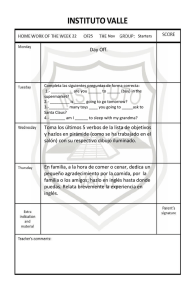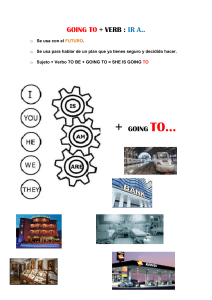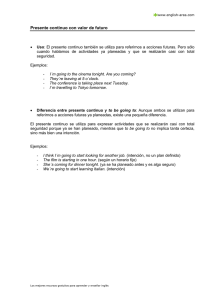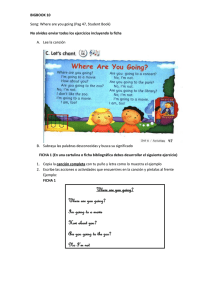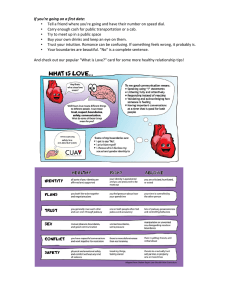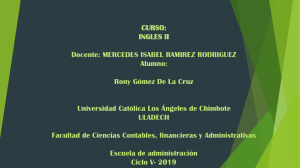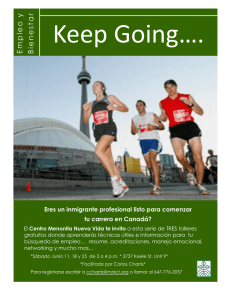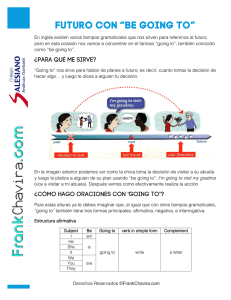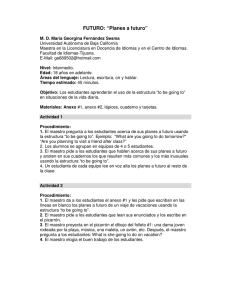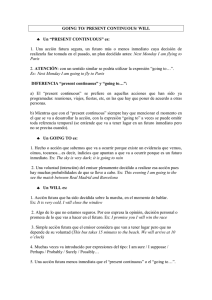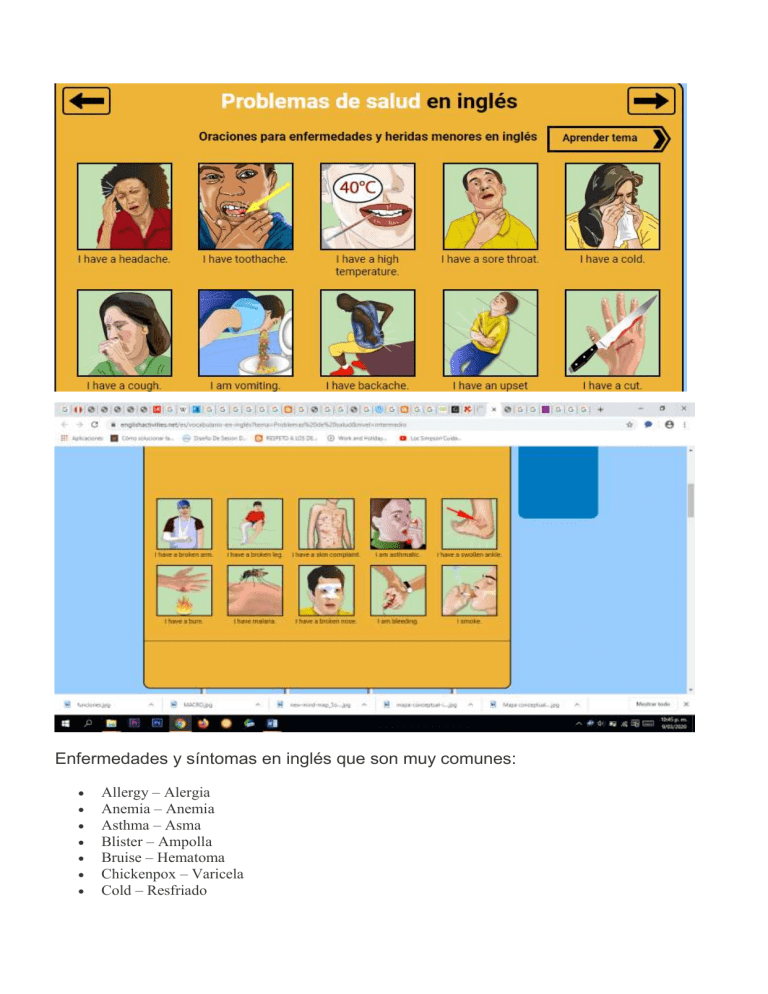
Enfermedades y síntomas en inglés que son muy comunes: Allergy – Alergia Anemia – Anemia Asthma – Asma Blister – Ampolla Bruise – Hematoma Chickenpox – Varicela Cold – Resfriado Constipation – Estreñimiento Cough – Tos Cramps – Calambres Diabetes – diabetes Diarrhea – Diarrea Dizziness – Mareo Fever – Fiebre Food Poisoning – Intoxicación por alimentos Fracture – Fractura Heart attack – Infarto Heartburn – Acidez estomacal Hemorrhage – hemorragia Hiccups – Hipo Infection – Infección Inflammation – Inflamación Injury – Herida Insomnia – Insomnio Itch – Picazón Measles – Sarampión Migraine – Migraña Mumps – Paperas Nausea – Náusea Nosebleed – Hemorragia nasal Pneumonia – Neumonía Runny nose – Nariz con mucosa Skin rash – Sarpullido Sore throat – Dolor de garganta Sprain – Esguince STD (Sexual Transmitted Disease) – Enfermedad de transmisión sexual Sting – Picadura Sun burn – Quemadura por el sol Sunstroke – Insolación Swelling – Hinchazón To sneeze – Estornudar Vomit – Vómito Ahora veamos el vocabulario de los posibles remedios que te recetarán para las enfermedades en inglés. Antibiotics – Antibióticos Band-Aid – Cura – Tirita Painkiller – Analgésico Bandage – Venda Análisis de sangre – Blood test Prescription – Receta/ fórmula médica Vaccine – Vacun My head hurts – Me duele la cabeza My stomach hurts – Me duele el estómago Ache: Se usa junto con un sustantivo, con la parte del cuerpo afectada por el dolor. La diferencia con “pain” es que “ache” puede ser sustantivo, verbo o adjetivo: Toothache – Dolor de muelas Headache – Dolor de cabeza Backache – Dolor de espalda Earache – Dolor de oído Pain: Como se dijo anteriormente, “pain” solamente actúa como sustantivo. I have a terrible pain – Tengo un terrible dolor Sore: Se refiere a dolor, pero más específicamente a irritación. Casi siempre se usa cuando hablamos de dolor en la garganta: Sore trhoat – Dolor de garganta Si se trata de una fractura, puedes utilizar el adjetivo “broken” I have a broken leg – Tengo una pierna rota I broke my arm – Me rompí el brazo Los verbos relacionados con las enfermedades en inglés son los siguientes: To hurt – Doler To get/be sick – Enfermarse To suffer – Sufrir una enfermedad To break – Romperse To give an injection – Poner una inyección To injure – Herir To prescribe – Recetar To sweat – Sudar To faint – Desmayarse To burn – Quemarse To bleed – Sangrar To swallow – Tragar To swell – Hinchar To diagnose – Diagnosticar To get over – Recuperarse Fever /temperature: fiebre Flu: gripe Cold: catarro, resfriado Infection: infección Travel sick: mareo (en un viaje) Runny nose: moqueo nasal Chesty cough: tos productiva Sore throat: dolor de garganta Stomachache: dolor de estómago Upset stomach: malestar estomacal Headache: dolor de cabeza Toothache: dolor de dientes Backache: dolor de espalda I’ve got a pain in my…. : me duele el/la…. TRATAMIENTOS Bandage: vendaje Injection: injección Medicine: medicina Operation: operación Prescripti on: receta Stitches: puntos Tirita: sticking-plaster (UK), band-aid (US) A check-up: un chequeo médico, una revis Hacer planes: I’m going to watch a TV show today. I’m going to quit smoking this year. We’re going to lose our flight. Are they going to eat cake in the party? I’m going to see my doctor tomorrow morning. Are you going to study this weekend? Hablar del futuro inmediato: Are you going to pay with your credit card? We are going to check this right now. Is she going to the supermarket now? 1. We use “be going to” to talk about (Usamos “be going to” para hablar de) plans for the future (planes para el futuro) and predictions based on what I see (predicciones con base en lo que veo). 2. I am going to fix my computer. Voy a reparar mi computador. 3. They are not going to buy a new house. Ellos no van a comprar una casa nueva. 4. Is she going to call me tomorrow? ¿Ella me va a llamar mañana? 5. We are going to watch a movie on Sunday. Vamos a ver una película el domingo. 6. She is not going to write the letter. Ella no va a escribir la carta. 7. Are you going to study for the exam? ¿Vas a estudiar para el examen? 8. Where are you going to sleep? ¿Dónde vas a dormir? I am going to sleep in my house. Voy a dormir en mi casa. 9. Are they going to have a party tomorrow? ¿Van a hacer una fiesta mañana? No, they aren’t. No. FUTURO PLANEADO (GOING TO) USO - Se trata de un futuro planeado porque decimos cuando se va a ejecutar la acción. Por ejemplo: I am going to go to David’s party this weekend. FORMACIÓN - Afirmativa: sujeto + am/is/are + going to + infinitivo + complementos Ejemplo: She is going to visit her aunt on Saturday - Negativa: sujeto + am/is/are + not + going to + infinitivo + complementos Ejemplo: She isn't going to visit her aunt on Saturday - Interrogativa: am/is/are + sujeto + going to + complementos? Ejemplo: Is she going to visit her aunt on Saturday? ejercicios will vs going to Ejercicio 1 Ejercicio 2 Futuro perfecto vs futuro continuo - Ejercicio 1 Futuro perfecto vs futuro continuo - Ejercicio 2 Futuro perfecto vs futuro continuo - Ejercicio 3 Ejercicio 3 Accede a los ejercicios de will y going to haciendo clic en la imagen de abajo. TEMAS RELACIONADOS Accede a los ejercicios de FUTURO PERFECTO y FUTURO CONTINUO haciendo clic sobre la imagen de la explicación de abajo. Ejercicios Conjuga los verbos entre paréntesis en future simple (going to). 1. Mr Potts (sell) his house. 2. Our neighbours (spend) 3. I (move) 4. My husband (build) 5. His friends (learn) their next holidays in the Caribbean. to another town. a tree house for the kids. English. Conjuga los verbos entre paréntesis en future simple (going to). 1. I (tell/not) you the secret. 2. She (ring/not) 3. We (invite/not) 4. Greg (work/not) 5. Her parents (lend/not) me. him to our party. abroad. her any more money. Formula oraciones interrogativas en future simple (going to). 1. (you/help/me) 2. (she/study/in Glasgow) 3. (they/paint/the room) 4. (he/apply/for that job) 5. (what/you/do) about this?
